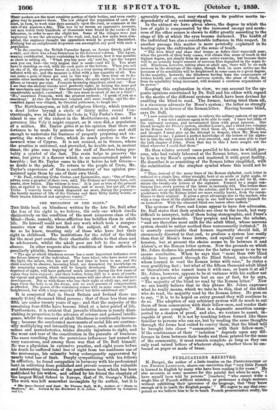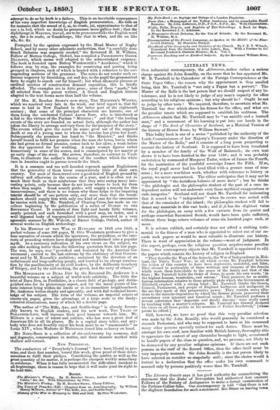PUBLICATIONS RECEIVED.
M. Darque, the author of a little treatise on the Pncequarciteriox OF THE FRENCH LANGUAGE, shares our conviction that " very little French is learned in English by many who:have been reading it for years." He also accounts in some measure for this painful fact when he says, " I have myolf been told by persons" [teachers] "who cannot write a single line of French without mistakes, or pronounce a single sentence without exhibiting their ignorance of the language, that 'they know enough of it to teach the English people.' " We regret to say that com- petent as we believe him to be to teach 'Preach pronunciation orally, his attempt to do so -by book is a failure. This is an inevitable consequence of his very imperfect knowledge of English pronunciation. He tells us for instance that the sound of é, ai, in etude, jai, approximates to that of our e in bed, which no doubt he pronounces more genie° bade; that the diphthongs in Mayence, travail, are-to be pronounced like the English word eye, the a in ouate, or Guadeloupe, like that in what, and the ou like wh, &c. &c.
Prompted by the opinion expressed by the Head Master of Rugby School, and by many other scholastic authorities, that "a carefully done Greek Delectus was -urgently needed," the Reverend H. M. Wilkins, Fellow of Merton College, Oxford, has compiled a Pacomarssrvz GREEK DELECTUS, which seems well adapted to the acknowledged exigency. The book is founded upon Bishop Wordsworth's "Accidence," which it follows step by step, the examples for construing and parsing being grouped in chapters, each of which is headed with a reference to the cor- responding sections of the grammar. The notes do not render such re- ference nugatory by furnishing, cut and dry, to the-pupil-the grammatical facts he ought to search out for himself; but when idiomatic phrases or cardinal niceties of construction demand exposition, this is briefly afforded. The examples are in Attic prose ; none of them "made," but all selected from the purest writers. A Greek and English lexicon adapted to the text forms more than half the volume.
Of Mrs. H. Beecher Stowe's new story, THE JURVISTER'S WOOING, which we received very late in the week, our brief report is, that the scene is laid in New England in the latter part of the eighteenth century ; that some of the principal characters are historic, one of them being the celebrated Colonel Aaron Burr, who is introduced as -a foil to the virtues of the Puritan " Minister ; " and that " the leading events of the story are founded on actual facts, although the author has taken the liberty to arrange and vary them for thepurposes of the story." The-events which give the novel its name grow out of the supposed death at sea of a young man to whom the heroine has given her heart. Subsequently she promises her hand to "the Minister," and thinks herself bound to fulfil her promise when the man she loves, butte whom she had given no formal promise, comes back to her alive, a week before the day appointed for her wedding. A negro woman figures rather humorously in some of the scenes, and is emancipated by her master at an:early stage of the story. She serves, therefore, in contrast to Uncle Tom, to illustrate the author's theory of the conduct which the white race in America ought to pursue towards the black.
It is a common and -too well founded reproach against Englishmen that the generality of them know comparatively little of their own country. Yet most of them travel over a good deal of English ground by railway and -otherwise in the course of a year, and it is often not so much their fault as their misfortune that they miss seeing many inte- resting points, only because they do not know where to look for them when they might. Good county guides will supply a remedy for this inconvenience, and there is no reason why these helps to the inquiring tourist should be of one pattern only, any more than that the trunk- makers should supply him with only one kind of case for the necessaries he carries with him. Mr. Stanford, of Charing Cross, has made an ex- cellent beginning by the publication of a series of Groins TO THE SOUTHERN COAST. It consists of four light and handy little volumes, neatly printed, and each furnished with a good map, an index, and a well digested -body of topographical information, presented in a very agreeable manner by Mr. Walcott, of Exeter College, Oxford, author of several works on English archaeology.
In his HISTORY OF THE WAR IN HUNGARY ca 1848 AND 1849, a pocket volume of some 300 pages, M. Otto Wenkstern professes-to give a tree narrative of events which the ignorance, the prejudices, or the inte- rests of preceding writers have disguised and transformed into a popular myth. Asa summary indication of his own views on the subject, we can offer nothing better than the following quotation from his last page. The war, he says, was "provoked and fomented by the Austrian Go- vernment ; .carried to the last extreme by the obstinacy of that Govern. ment and by M. Xossuth's ambition.; sustained by the devotion of an unfortunate and lorsg-suffering people, and hurried to its abrupt termina- tion by the pusillanimity of its civil leaders, by the deliberate treachery of GOrgey, and by the self-seeking, the greed, and the envy of others."
The Mowoosurn or Duna DEN by the Reverend Dr. Anderson is a beautiful volume on a subject of world-wide celebrity. The little dis- trict of Dura Den, in Perthshire, is a classic field of geology, and distin- guished also for its picturesque aspect, and for the many points of his- toric interest lying within its limits or in its immediate neighbourhood. Dr. Anderson writes clearly and agreeably, and with full technical-know- ledge of his subject. The form of the volume, an imperial octavo of ninety-six pages, gives the advantage of a large scale to the finely- coloured illustrations, many of which fill a double page.
The author of-" The -Rifle, Axe, and Saddle-bags " is already favour- ably known to English readers, and his new work, Too YEARS or PREACHER-LIFE, will increase their good humour towards him. Mr. Milburn is a man of talent and culture, who has seen a great deal of American life in all its phases. He is a capital story teller, and any- body who does not heartily enjoy his book must be as " unamusable " as Louis XIV., when Madame de "Maintenon -found him so heavy on hand.
Mr Nors-Boos is a collection of six-and-twenty lay sermons, dull and dogmatic, commonplace in matter, and their manner marked with shallow self-conceit.
NEW PERIODICAL.
The conductors of "Everybody's Journal" have been liberal in pro- mise, and their first slumber, issued this week, gives proof of their deter- mination to fulfil their pledges. -Considering the quality as well as the great quantity of its matter, it is perhaps the cheapest weekly miscellany in existence. When it has fully surmounted the difficulties incident to all beginnings, there is reason to hope that it will make good its right to its -bold title.
Boors.
The Minister's Wooing. By H. Beecher Stowe, Author of "Uncle Tom's Cabin," &c. &c. With Illustrations by Phis.
774e Minister's Wooing. -By B. Beecher Stowe. Cheap Edition.
Ten Years of Preaches-We : Chapters from an Autobiography. By William :Henry 'Milburn, Author of " The 'Rifle, Axe, and Saddle-bags."
History orthe Frar in Hungary in 1848 and 1049. By Otto Wcnkstern. My Note,Book ; ar, Sayings and Doings of a London Physician.
Dora Den ; a -Monograph of the Yellow Sandstone and its remarkable:Pt/41 Remains. By John Anderson, D.D.,F.G.S., tze. with lllustratiens. Walks, Talks, Travels, and Exploits of Soo Schoolboys. A Book for Btri. By the Reverend J. C. Atkinson.
A Progressire-Greek Damien, for the Use of Schools. By the Reverend al. Wilkins, M.A.
...Pronunciation of the French Language, as. Spoken in the Middle of the Nine- teenth Century. By Monsieur //argue.
Handbook of the Geography and Statistics of the Church. By J. E. T. WiltaCh, Translated from the German by John Leitch, Esq. With a Preface by the Reverend Frederick Denison Maurice, M.A. Vol. 1.
Papers on Teaching and on Kindred Subjects. By the Reverend William Ross, B.A.



























 Previous page
Previous page